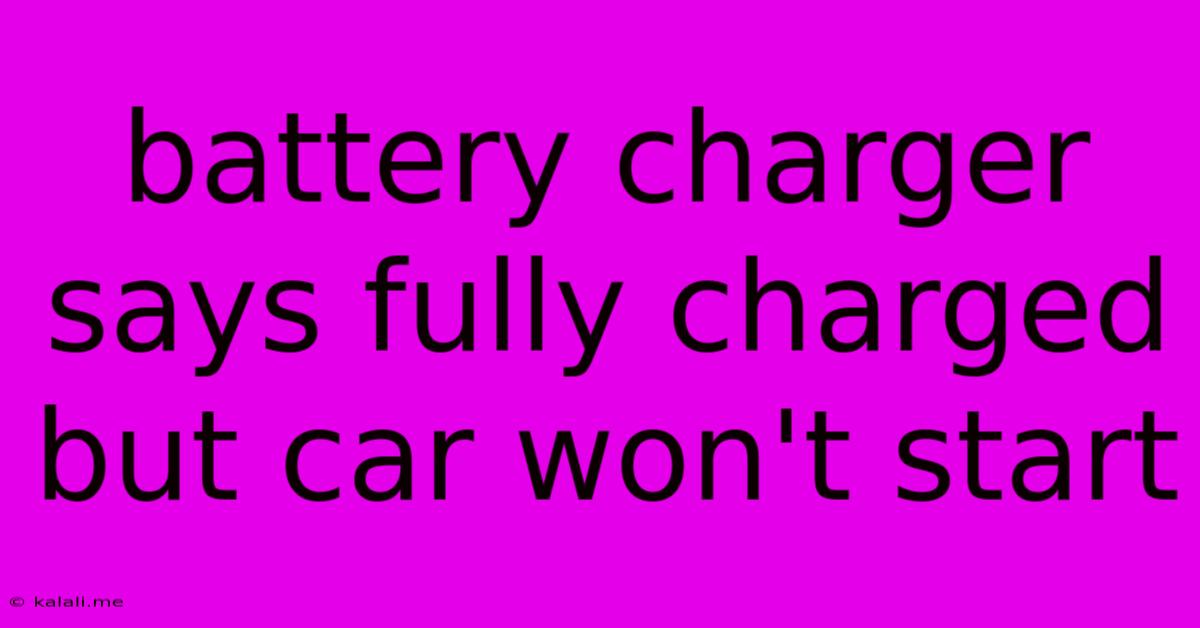Battery Charger Says Fully Charged But Car Won't Start
Kalali
May 31, 2025 · 3 min read

Table of Contents
Battery Charger Says Fully Charged But Car Won't Start: Troubleshooting Guide
Your battery charger proudly proclaims "Fully Charged," yet your car remains stubbornly uncooperative. This frustrating situation can stem from several issues, going beyond a simple dead battery. This guide will help you diagnose the problem and get your car back on the road. We'll explore common culprits and provide straightforward troubleshooting steps.
Why Your Car Won't Start Even After a Full Charge:
A fully charged battery indicator on the charger doesn't always guarantee a healthy battery capable of starting your car. The problem might lie within the battery itself, the charging process, or other car components.
1. The Battery Itself:
-
Sulfation: This is a common issue where lead sulfate crystals build up on the battery plates, hindering their ability to accept and release a charge effectively. Even with a full charge, the sulfation prevents the battery from delivering sufficient power to the starter motor. This is often a symptom of consistently undercharging the battery.
-
Internal Short Circuit: A short circuit within the battery can prevent it from holding a charge, even if the charger indicates otherwise. This is often irreparable and requires battery replacement.
-
Cell Failure: One or more cells within the battery may have failed. A failed cell will prevent the battery from reaching its full potential and delivering the cranking amps needed to start the engine. You might notice a visibly bulging battery or a significant drop in voltage.
2. The Charging Process:
-
Faulty Charger: Your battery charger might not be functioning correctly. Try using a different charger to rule this out. Ensure the charger is compatible with your battery type and voltage.
-
Incorrect Charging Method: Using the wrong charging method (e.g., using a fast charger on an older battery) can damage the battery and prevent it from holding a charge properly.
-
Insufficient Charging Time: Even with a good charger, insufficient charging time may result in a seemingly full charge that isn't actually sufficient for starting the car. Refer to your charger's instructions for appropriate charging time based on your battery's capacity.
3. Other Car Components:
-
Starter Motor: A faulty starter motor can struggle to turn over the engine even with a fully charged battery. You might hear a clicking sound or a slow cranking sound when you try to start the car.
-
Alternator: The alternator is responsible for charging the battery while the engine is running. A faulty alternator will not recharge the battery, leading to repeated starting problems.
-
Wiring and Connections: Corrosion or loose connections in the battery terminals, starter motor wiring, or alternator wiring can prevent proper current flow. Inspect for corrosion and tighten any loose connections.
-
Ignition System: Problems with the ignition switch, ignition coil, or spark plugs can prevent the engine from starting, even with sufficient battery power.
Troubleshooting Steps:
-
Visual Inspection: Check the battery for any signs of damage (bulging, cracks, corrosion). Inspect the terminals for corrosion and clean them thoroughly. Tighten the terminal connections.
-
Voltage Test: Use a multimeter to measure the battery voltage. A healthy battery should read around 12.6 volts when fully charged. A lower voltage indicates a problem.
-
Load Test: A load test measures the battery's ability to deliver a current under load (similar to the demands of starting the engine). This is a more accurate assessment than just checking voltage. An auto parts store can perform this test.
-
Check the Charger: Use a different battery charger to rule out a faulty charger.
-
Check Alternator Output: Have the alternator tested at an auto parts store to ensure it's charging the battery correctly.
-
Inspect Starter Motor and Wiring: Visually inspect the starter motor and related wiring for any signs of damage.
-
Seek Professional Help: If you are unable to identify the problem after these steps, consult a qualified mechanic for further diagnosis and repair.
By systematically checking these potential issues, you can effectively troubleshoot why your car won't start even after a fully charged battery. Remember, safety is paramount – always disconnect the battery terminals before performing any maintenance.
Latest Posts
Latest Posts
-
What Happens With Electrons In A Covalent Bond
Jun 02, 2025
-
How To Replace Ceiling Fan Light Bulb
Jun 02, 2025
-
What To Do With Hyacinth Bulbs After Blooming
Jun 02, 2025
-
And From Your Lips She Drew The Hallelujah
Jun 02, 2025
-
Do Random Pillager Captains Depsawn Minecraft
Jun 02, 2025
Related Post
Thank you for visiting our website which covers about Battery Charger Says Fully Charged But Car Won't Start . We hope the information provided has been useful to you. Feel free to contact us if you have any questions or need further assistance. See you next time and don't miss to bookmark.